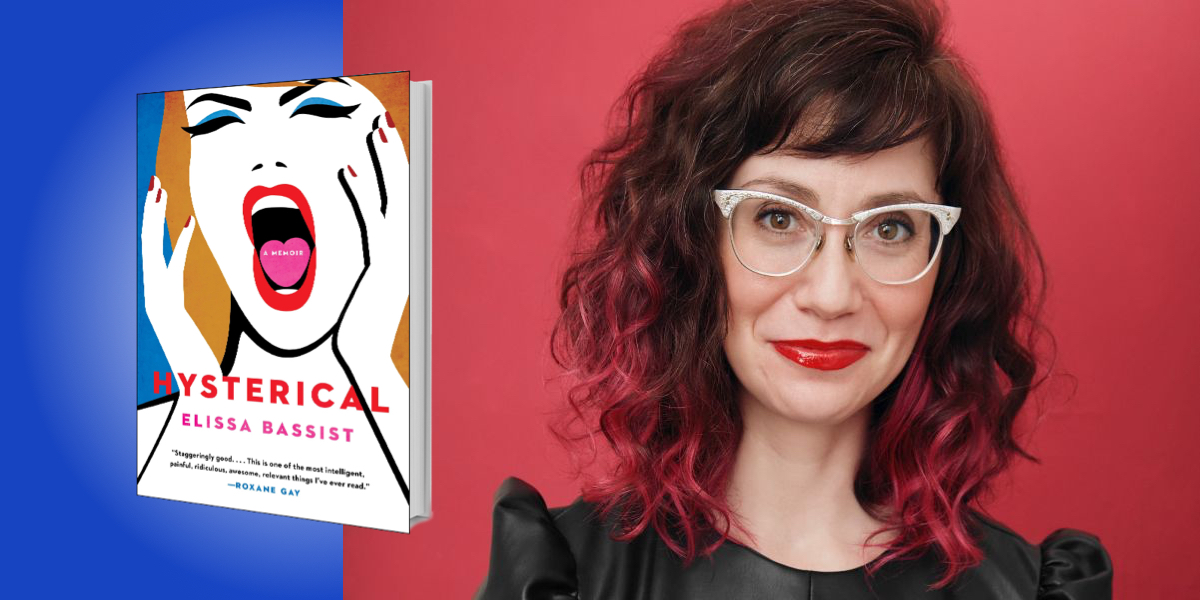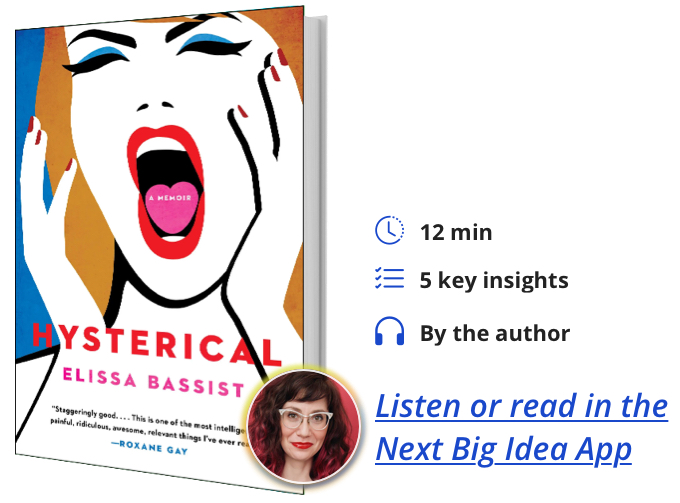Elissa Bassist is an essayist, humor writer, and editor of the “Funny Women” column on The Rumpus.
Below, Elissa shares 5 key insights from her new book, Hysterical: A Memoir. Listen to the audio version—read by Elissa herself—in the Next Big Idea App.
1. You’re not imagining it.
“What if nothing’s wrong with you?” a gastroenterologist asked me the day before she called with the results of my blood work that revealed a fatal disease. For two years of my life, one doctor led to another, and I had no diagnosis. The diagnosis was that nothing was wrong with me or that I had a mental illness. This is “medical gaslighting,” when doctors brush off your concerns or delay treatment or describe you as “oversensitive” even when you’re in pain. It causes pointless suffering and even death. If you’re a woman, BIPOC, LGBTQIA+, or older, then you’re more likely to endure medical gaslighting.
Red flags that I ignored—because I wanted to be a “good patient” and not annoy anyone—were dismissive questions about my symptoms that made me feel unimportant and ridiculous, like, “Are you even in the pain that you say you’re in?”
The average white man has shorter wait times for appointments and diagnoses, is given pain medication when he needs it (even if he doesn’t), is referred for tests, and is listened to and believed. We are the experts of and authorities on our own bodies. When something’s wrong, we know it, we feel it, we’re in bed because of it. We’re not making it up, and no one in a position to save us should assume we are.
2. You’re not crazy.
You’re crazy. Every woman has heard it at least one thousand times. Some doctors didn’t think I was sick; they thought I was crazy. In 2017, former presidential aide Jason Miller called then-Senator Kamala Harris “hysterical” during a hearing over Jeff Sessions’ collusion with Russia during the 2016 election. “I mean, she was asking some tough questions,” Miller offered as proof.
Labels like “crazy” and “hysterical” collapse the distinction between vocal, inquisitive, emotional, irrational, neurotic, insane, melodramatic, hormonal, oversensitive, irritating, and clinical—until “vocal” itself is a symptom. Until expressive women are madwomen, whether or not we’re mad or ill or mentally ill.
“The medical institution needs only a small revolution: listen to and believe women and marginalized communities.”
We’re drugged all the same. Women are over-diagnosed and overmedicated for mental illness, but we’re under-treated for physical ailments and are more prone to chronic pain. One study “estimated that up to a third of patients in primary care…have ‘medically unexplained symptoms,’” and about 70 percent are women.
The medical institution needs only a small revolution: listen to and believe women and marginalized communities. Stop telling women to “lose weight” as a cure-all. Treat a woman’s body like the human body. Include women in medical research. Test medications on women. Teach menopause in medical school. Delete “crazy” and “hysterical” from the medical vocabulary.
3. Emotional pain can become physical.
Being called “crazy” or any synonym keeps women quiet while keeping us crazy. It also keeps us in pain, which keeps us powerless. That made me really, really, really mad. But I didn’t say I was mad until someone asked.
Every undiagnosed sick person will hear, “Have you tried acupuncture?” I did.
“Are you angry?” the acupuncturist asked me at our initial session.
“Yes,” I said, without thought or mercy.
She asked how often I was angry.
“All the time.”
She asked me if I’d expressed my anger.
I laughed, like this was an option. Like anger did not have to be extracted from my mouth like wisdom teeth. She suggested that repressed rage was a contributing factor, if not catalyzing force, of my physical maladies. She was, in a way, saying I was hysterical.
“Basically, if you don’t share your story, your pain will tell it for you.”
Plot twist—there’s truth to the connection between mind, body, and throat, to the inside transcribing on the outside in the form of intense pain along the nerves. Today’s mind-body doctors theorize that some physical pain is, in fact, repressed emotional pain finding expression, that emotions like rage pile up in the unconscious, going unarticulated until they hit max capacity and tell the brain to create physical symptoms. Basically, if you don’t share your story, your pain will tell it for you.
4. Silence can make us sick.
Women have been taught to be ladylike, quiet, polite, deferential, and selfless, and because of this we report our pain less than men, and we repress it.
Speaking up for myself was not how I learned English. Instead, I became fluent in Apology, in Asking for It, in Miscommunication, in Suppression. I felt like I had to say things “just right” to fit in at work or in a relationship. Per news stories ad infinitum, women have everything to lose and almost nothing to gain from speaking up, emoting, or whistleblowing. My experiences, across time and space, reinforced silence as my best option.
My inability to speak up for myself became so extreme that I was referred to an OCD specialist. My silence had metastasized into an obsessive fear of “saying the wrong thing” that compelled me to interrogate, edit, and censor myself compulsively. It made me physically ill.
Repression is known to cause digestive havoc, respiratory problems, and full-body stress; it imperils our minds, bodies, and souls like a virus by reducing agency, compromising thinking and sense of self, while isolating and disempowering us. Women—who should be seen and not heard—are uniquely susceptible to incommunicable physical pain of no origin.
5. Risk.
The acupuncturist who’d diagnosed my rage prescribed a talking cure. As if treating the voice would treat the problem.
It did.
“Since my survival instinct was to stay quiet, speaking up was simple but not easy.”
In the 19th century a woman—the “mute hysteric” “Anna O.,” whose real name was Bertha Pappenheim and who later founded the Jewish feminist movement—came up with the term the “talking cure” to describe how expression restored sanity and health. Her doctor was Dr. Freud’s colleague; both men helped “hysterical” patients by getting them to talk about what they couldn’t. They then put the unnamable into a narrative and the symptoms into a critical interpretation, after which the symptoms dissipated.
In the 1980s, psychologist James Pennebaker found that “expressive writing,” his theory that writing one’s wounds helps close them, improved immune function.
Expression helps women especially. Author Soraya Chemaly writes in Rage Becomes Her: The Power of Women’s Anger about research showing “the survival rate for women with breast cancer who expressed their anger was twice that of women who kept their anger to themselves.”
Part of my survival was learning to voice my every emotion and to speak up for myself—with doctors and in general about everything I’d been told not to talk about because it wasn’t “nice.” Since my survival instinct was to stay quiet, speaking up was simple but not easy. “It’s risk,” my OCD specialist told me. Risk going against lifetimes of socialization. Risk saying the wrong thing. Risk being perceived as unreasonable, and risk being called “unlikeable.” Risk demanding help. Risk again and again, like your life depends on it, because it does. Your voice is as essential as your breath or your heartbeat.
To listen to the audio version read by author Elissa Bassist, download the Next Big Idea App today:

































